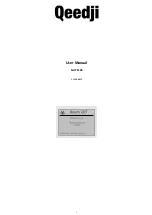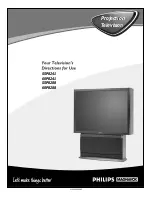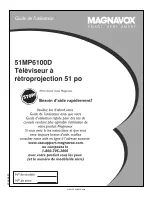
10
Name and function of each part
〈
Projector
〉
POWER button
This button is used to turn the projector
power supply on and off.
•This button is enabled while the MAIN
POWER switch is ON.
SYSTEM SELECTOR button
This button is used to select RGB, RGB
REALITY, or YP
B
P
R
(YC
b
C
r
) signal or switch
between video and digital-serial signal formats.
Arrow buttons
These buttons are used to select and
adjust items in the on-screen menus.
LENS button
This button is used to select the mode
for adjusting the lens.
PIC-MUTE button
This button is used to temporarily halt the
projection of a picture.
Network terminals
These terminals are used to LAN
interface and this equipment has a
function for automatically sending
e-mail when the equipment is
abnormal, so a system for remote
control or central control can be
easily realized.
MAIN POWER switch
This switch turns the
main power supply to
the projector on and off.
REMOTE IN 2 input/output
connector
This connector is used to
connect a wired remote control
unit to control the projector when
using it in a multi-screen
projection system.
INPUT button
This button is used to change the input between
INPUT 1 / INPUT 2 / INPUT 3.
If there are several input terminals in a single
input slot, the selection will change in order
between all input terminals available for that slot.
MENU button
This button is used to make the MENU
screen and the respective adjustment
screens appear on the projection screen, and
to return to a previously-displayed screen.
ENTER button
This button is used to accept and activate
items selected in the on-screen menus.
Control level buttons
These buttons are used to adjust the
BRIGHT, CONTRAST, COLOR and TINT
and to adjust the lens.
Power indicator
When the MAIN POWER switch is pressed, this
indicator becomes red and the projector switches
to standby mode. When the POWER button on the
remote control unit or the projector operating panel
is pressed, the indicator changes to green, and
after a brief period, a picture is then projected.
Self-diagnosis display
If a problem with the operation of the
projector is detected, a two-digit code
appears in this display.
If a code appears, stop using the
projector and ask the place of purchase
to check the projector.
(The code"FC"
under the operation of the cooling fan is not
an error code,refer to Note on page 15.)
Remote control signal receptor
This receives the signals which are
sent from the remote control unit.
Projection lens (sold separately)
This lens enlarges the image and
projects it onto the screen.
Installation bays for input modules (sold separately)
(These are designated as slot 1, slot 2 and slot 3 in order from the top.)
RS-232C/RS-422 OUT connector
When using a personal computer to control a multi-screen projection system, this connector is
used to connect this projector to the RS-232C/RS-422 IN connector of the next projector.
RS-232C/RS-422 IN connector
If you would like to use a personal computer to control the projector operation,
connect the RS-232C/RS-422 output connector of the computer to this terminal.
REMOTE IN 1 connector
This connector is used to connect an external control circuit in order to turn
the projector power on and off and to change the input source externally.
POWER
INPUT
SYSTEM
SELECTOR
MENU
ENTER
LENS
PIC-MUTE
@@@@@@@@e?
@@@@@@@@e?
@@h?
@@h?
@@h?
@@h?
@@h?
@@h?
@@@@@@@@e?@@@@@@@@?e@@@@@@@@e?@@@@@@@@?e@@@@@@@@e?@@@@@@@@?e@@@@@@@@e?@@@@@@@@?e@@@@@@@@e?@@@@@@@@?e@@@@@@@@e?@@@@@@@@?e@@@@@@@@e?@@@@@@@@?e@@@@@@@@e?
@@@@@@@@e?@@@@@@@@?e@@@@@@@@e?@@@@@@@@?e@@@@@@@@e?@@@@@@@@?e@@@@@@@@e?@@@@@@@@?e@@@@@@@@e?@@@@@@@@?e@@@@@@@@e?@@@@@@@@?e@@@@@@@@e?@@@@@@@@?e@@@@@@@@e?
@@@@@@@@
@@@@@@@@
@@
@@
@@
@@
@@
@@
@@
@@
@@
@@
@@
@@
@@
@@
@@
@@
@@
@@
@@
@@
@@
@@
@@
@@
@@
@@
@@
@@
@@
@@
@@
@@
@@
@@
@@
@@
@@
@@
@@
@@
@@
@@
@@
@@
@@
@@
@@
@@
@@
@@
@@
@@
@@
@@
@@
@@
@@
@@
@@
@@
@@
@@
@@
@@
@@
@@
@@
@@
@@
@@
@@
@@
@@
@@
@@
@@
@@
@@
@@
@@
@@
@@
@@
@@
@@
@@
@@
@@
@@
@@
@@
@@
@@
@@
@@
@@
@@
@@
@@
@@
@@
@@
@@
@@
@@
@@
@@
@@
@@
@@
@@
@@
@@
@@
@@
@@
@@
@@
@@
@@
@@
@@
@@
@@
@@
@@
@@
@@
@@
@@
@@
@@
@@
@@
@@
@@
@@
@@
@@
@@
@@
@@
@@
@@
@@
@@
@@
@@
@@
@@
@@
@@
@@
@@
@@
@@
@@
@@
@@
@@
@@
@@
@@
@@
@@
@@
@@
@@
@@
@@
@@
@@
@@
@@
?@@
?@@
?@@
?@@
?@@
?@@
?@@@@@@@@
?@@@@@@@@
?@@@@@@@@?e@@@@@@@@e?@@@@@@@@?e@@@@@@@@e?@@@@@@@@?e@@@@@@@@e?@@@@@@@@?e@@@@@@@@e?@@@@@@@@?e@@@@@@@@e?@@@@@@@@?e@@@@@@@@e?@@@@@@@@?e@@@@@@@@e?@@@@@@@@
?@@@@@@@@?e@@@@@@@@e?@@@@@@@@?e@@@@@@@@e?@@@@@@@@?e@@@@@@@@e?@@@@@@@@?e@@@@@@@@e?@@@@@@@@?e@@@@@@@@e?@@@@@@@@?e@@@@@@@@e?@@@@@@@@?e@@@@@@@@e?@@@@@@@@
@@g
@@g
@@g
@@g
@@g
@@g
@@@@@@@@
@@@@@@@@
@@
@@
@@
@@
@@
@@
@@
@@
@@
@@
@@
@@
@@
@@
@@
@@
@@
@@
@@
@@
@@
@@
@@
@@
@@
@@
@@
@@
@@
@@
@@
@@
@@
@@
@@
@@
@@
@@
@@
@@
@@
@@
@@
@@
@@
@@
@@
@@
@@
@@
@@
@@
@@
@@
@@
@@
@@
@@
@@
@@
@@
@@
@@
@@
@@
@@
@@
@@
@@
@@
@@
@@
@@
@@
@@
@@
@@
@@
@@
@@
@@
@@
@@
@@
@@
@@
@@
@@
@@
@@
@@
@@
@@
@@
@@
@@
@@
@@
@@
@@
@@
@@
@@
@@
@@
@@
@@
@@
@@
@@
@@
@@
@@
@@
@@
@@
@@
@@
@@
@@
@@
@@
@@
@@
@@
@@
@@
@@
@@
@@
@@
@@
@@
@@
@@
@@
@@
@@
@@
@@
@@
@@
@@
@@
@@
@@
@@
@@
@@
@@
@@
@@
@@
@@
@@
@@
@@
@@
@@
@@
@@
@@
@@
@@
@@
@@
@@
@@
Handle
NOTE
• The handle of the product may be not be depicted in the illustration on some pages.











































